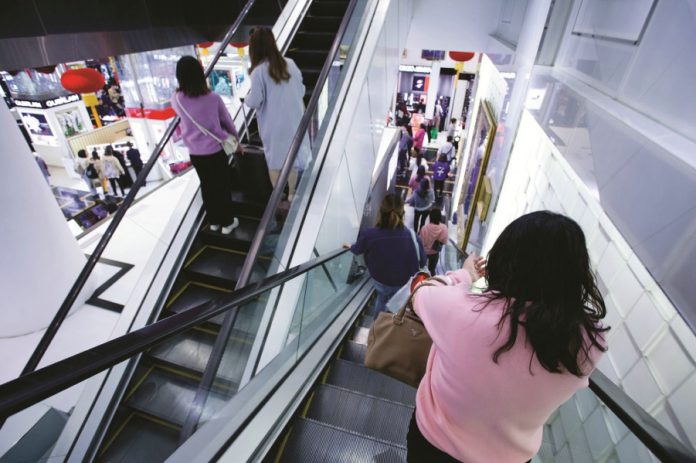Every MOP1 of visitor expenditure can create MOP7,896-worth of additional gross domestic product (GDP) in Macau conclude two Chinese researchers who have been studying the official statistics since 2010.
“There is only a slightly significant correlation between GDP in Macau and visitor expenditure,” they say. “This may indicate that more attention should be paid to how to raise the level of visitor expenditure.”
This means tourists could and should spend more when they visit the Macau SAR.
“As well as the gaming industry (not included in visitor expenditure) the tourism industry significantly contributes to the economic development of Macau,” state Wang Jingwen and Liang Mingzhu, from Jinan University.
In 2016, the direct contribution of Travel & Tourism to Macau GDP was MOP97,858 million (US$12,239 million) or 27.3 per cent of total GDP (ranking 4th in the world). The total contribution of Travel & Tourism to Macau GDP was MOP204,813 million (US$25,616 million) or 57.2 per cent of GDP (ranking 7th in the world). Visitor exports generated MOP233,535 million (US$29,208 million) or 87.0 per cent of total exports in 2016 (ranking 2nd in the world).
In one word, “compared with other Asian countries, tourism accounts for a large proportion of the economic development of Macau” – but the results could be much better observes Wang.
Wang and Liang, in fact, wrote an essay “to analyse the impact of per capita spending by the major types of expense on per capita spending of visitors. More specifically, our study aims to identify what kinds of per capita spending act on the per capita spending of visitors the most.”
They conclude that a better transportation system, female consumption and cultural tourism products are “the key points associated with high pulling function [affecting] visitor expenditure. These findings may provide strategic insights for diversifying Macau tourism development, with the aim of achieving a greater economic impact and competitive advantage under the guiding of positive features of the consumer society.”
According to the paper Characteristics of visitor expenditure in Macau and their impact upon its economic growth, shopping occupies the largest proportion of per capita spending of visitors (“in accord with the characteristics of contemporary mainstream consumption culture from the perspective of the consumer society.”)
“However, the pulling function of ‘shopping’ is slightly lower than ‘transportation’,” they say, adding that this “unique phenomenon can be interpreted [such that] a reasonable transportation system will offer more consumption opportunities to visitors.”
Furthermore, ‘accommodation’ and ‘food and beverage’ present a relatively weak pulling effect, “which means that there should be more added value to these industries. The added value of accommodation and food industry will diversify the options of consumption such as recreation, leisure and cultural creativity,” believe Wang and Liang.
 ‘Pastel de Nata,’ almond cakes and perfumes
‘Pastel de Nata,’ almond cakes and perfumes
‘Local food products,’ ‘jewels and watches,’ and ‘clothing’ occupy the three main shopping magnets. The consumption amounts of ‘cosmetics and perfume’ and ‘handbags and shoes’ are slightly lower than other categories. Individually, state the authors, ‘local food products’ and ‘cosmetics and perfume’ maintain a rising trend in fluctuation. ‘Jewels and watches’ and ‘handbags and shoes’, however, present an obvious declining trend since 2014.
“It is deserving of note that ‘local food products’ have an obvious pulling function to visitor expenditure, proving its high level of popularity,” say the paper’s authors when comparing this category with luxuries and other commodities. They underline the fact that ‘local food products’ “have strong cultural attributes. It is a kind of cultural consumption of powerful symbolic character which shows that the traditional culture of Macau is alive and has a strong attraction for tourists.”
The authors propose an idea that must be read carefully in Macau due to its geographic position, saying: “Macau may not be able to compete in the mass consumption market and the luxury market with the shopping paradise of Hong Kong.”
Despite the consumption of ‘cosmetics and perfume’ being slightly lower than other categories the authors see in this commodity an enormous potential, which “is the most obvious pulling function for per capita spending of visitors. This phenomenon indicates that female consumers have a large spending power in Macau, and are a representative group in consumer society.”
 Recommendations
Recommendations
“Undoubtedly, the long stay of visitors will increase visitor expenditure. Moreover, long-haul travellers may have relatively low price sensitivity, which in turn may lead to their higher expenditure,” the authors conclude.
“[Regarding] future development there is a great need to increase the consumption level and stay period of visitors. To achieve this goal, the public Administration – which in many cases makes generic promotion campaigns – may, in its promotional activities, consider targeting potential consumers who have a superior level of expenditure . . . [and that] . . . the improvement of transportation will bring more consumption opportunities promoting visitor expenditure.”
“From our step by step empirical analysis, we can conclude that visitor expenditure is positively conducive to the growth of GDP. Improved infrastructure, convenient travel environment, and diversified culture-based products can all [deliver] better consumer experiences, which will be helpful in promoting the level of visitor expenditure,” concludes Characteristics of visitor expenditure in Macau and their impact upon its economic growth, published a few months ago in scientific magazine Tourism Economics.
Research undertaken in China
Scientific research undertaken in Mainland, especially vis-a-vis the social sciences, suffers from a chronic problem: the inability of authors to detach themselves from official discourse, often adopting it without recognising the need for counterpoint.
This paper reflects this when the authors are not dealing with statistics.
An example: “It is commonly said that around 1553 the Portuguese bribed officials in Guangdong to allow them to anchor and trade from Macau” – this despite several Chinese authors contesting this idea.
Another: “Driven by the government incentive policy and regional economic environment, Macau has created a miracle in the development of [its] micro economy in the history of the world.”
























